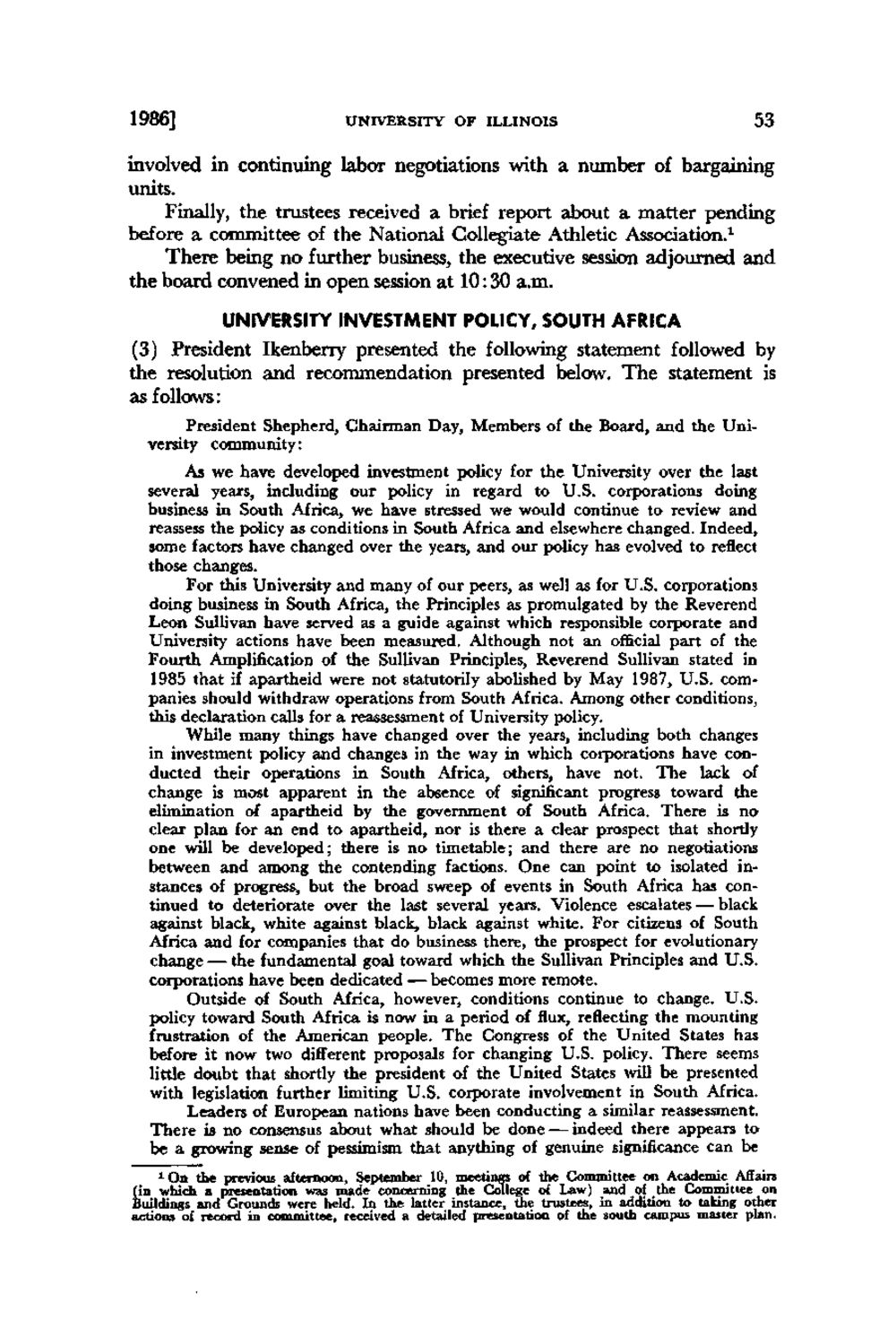| |
| |
Caption: Board of Trustees Minutes - 1988
This is a reduced-resolution page image for fast online browsing.

EXTRACTED TEXT FROM PAGE:
1986] UNIVERSITY OF ILLINOIS 53 involved in continuing labor negotiations with a number of bargaining units. Finally, the trustees received a brief report about a matter pending before a committee of the National Collegiate Athletic Association.1 There being no further business, the executive session adjourned and the board convened in open session at 10:30 a.m. UNIVERSITY INVESTMENT POLICY, SOUTH AFRICA (3) President Ikenberry presented the following statement followed by the resolution and recommendation presented below. The statement is as follows: President Shepherd, Chairman Day, Members of the Board, and the University community: As we have developed investment policy for the University over the last several years, including our policy in regard to U.S. corporations doing business in South Africa, we have stressed we would continue to review and reassess the policy as conditions in South Africa and elsewhere changed. Indeed, some factors have changed over the years, and our policy has evolved to reflect those changes. For this University and many of our peers, as well as for U.S. corporations doing business in South Africa, the Principles as promulgated by the Reverend Leon Sullivan have served as a guide against which responsible corporate and University actions have been measured. Although not an official part of the Fourth Amplification of the Sullivan Principles, Reverend Sullivan stated in 1985 that if apartheid were not statutorily abolished by May 1987, U.S. companies should withdraw operations from South Africa. Among other conditions, this declaration calls for a reassessment of University policy. While many things have changed over the years, including both changes in investment policy and changes in the way in which corporations have conducted their operations in South Africa, others, have not. T h e lack of change is most apparent in the absence of significant progress toward the elimination of apartheid by the government of South Africa. There is no clear plan for an end to apartheid, nor is there a clear prospect that shortly one will be developed; there is n o timetable; and there are no negotiations between and among the contending factions. One can point to isolated instances of progress, but the broad sweep of events in South Africa has continued to deteriorate over the last several years. Violence escalates — black against black, white against black, black against white. For citizens of South Africa and for companies that do business there, the prospect for evolutionary change — the fundamental goal toward which the Sullivan Principles and U.S. corporations have been dedicated — becomes more remote. Outside of South Africa, however, conditions continue to change. U.S. policy toward South Africa is now in a period of flux, reflecting the mounting frustration of the American people. The Congress of the United States has before it now two different proposals for changing U.S. policy. There seems little doubt that shortly the president of the United States will be presented with legislation further limiting U.S. corporate involvement in South Africa. Leaders of European nations have been conducting a similar reassessment. There is no consensus about what should be done — indeed there appears to be a growing sense of pessimism that anything of genuine significance can be i 1 On the previous afternoon, September 10, meetings of the Committee on Academic Affairs in which a presentation was made concerning the College of Law) and of the Committee on luildings and Grounds were held. In the latter instance, the trustees, in addition to taking other actions of record in committee, received a detailed presentation of the south campus master plan.
| |